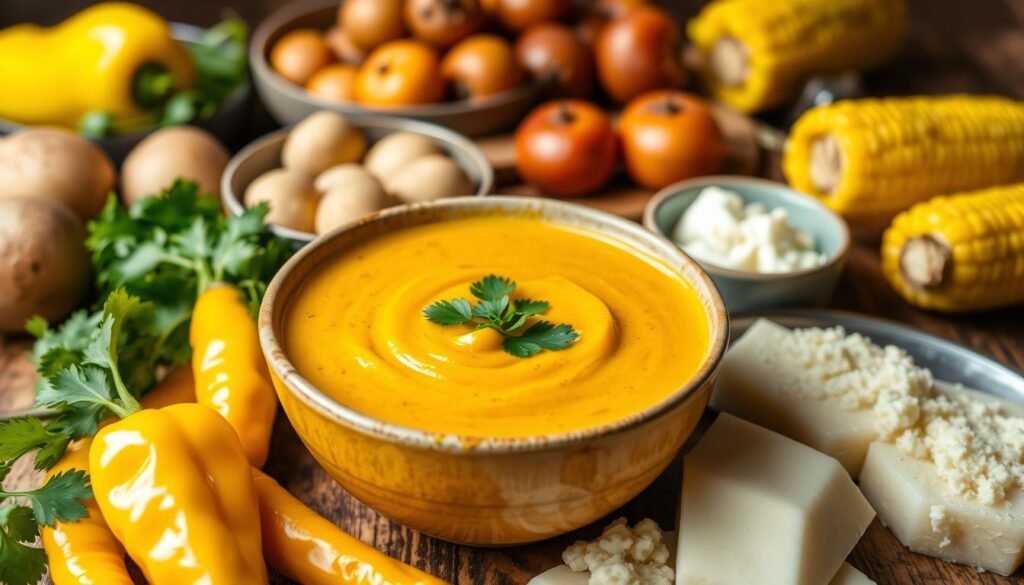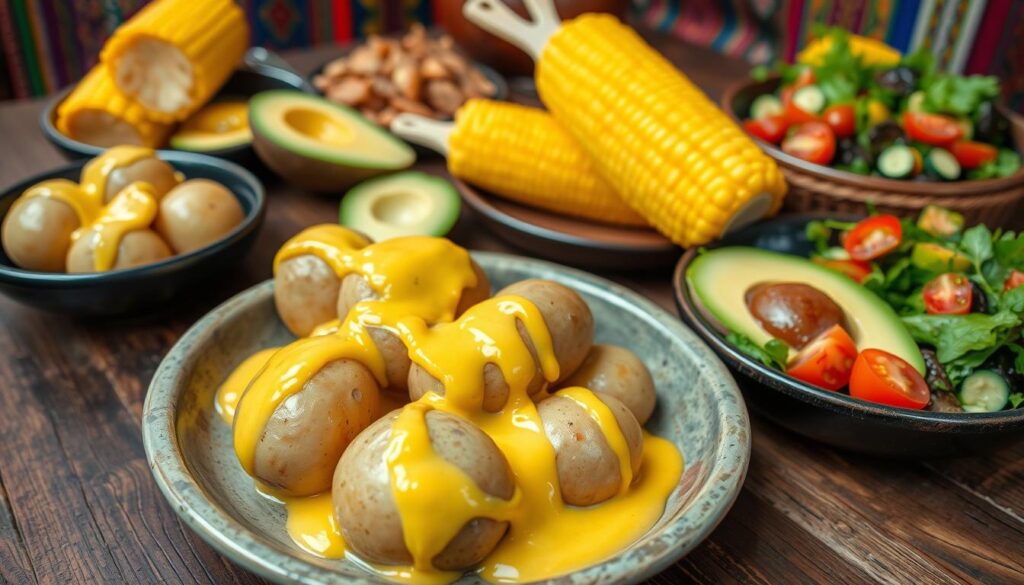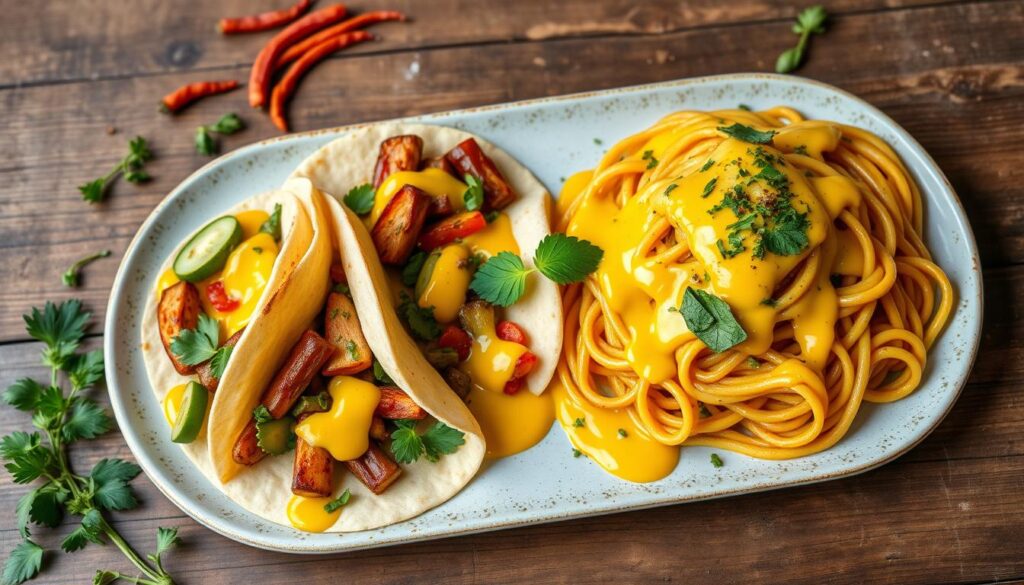
Every dish has a story, and huancaina sauce tells the tale of Peruvian food. Picture yourself in Huancayo’s high-altitude kitchens. Here, cooks for generations have made simple things into a golden, creamy delight. It’s a key part of South American food culture.
Huancaina sauce is more than just a sauce. It’s a symbol of Peruvian food traditions. It comes from Huancayo and shows the lively spirit of Peruvian cooking. Its bright yellow color is like the warmth of Peruvian welcome, inviting you to a world of taste.
Peruvian food is all about creativity, mixing local and global tastes. Huancaina sauce is a perfect example. It’s a creamy, spicy mix that shows Peru’s rich cultural mix.
Key Takeaways
- Huancaina sauce originates from the Andean city of Huancayo
- Represents the rich culinary heritage of Peruvian cuisine
- Combines local ingredients with unique flavor profiles
- Symbolizes the cultural diversity of Peruvian cooking
- A versatile sauce used in multiple traditional dishes
The Rich Heritage of Peruvian Cuisine
Peruvian cuisine is a colorful mix of flavors. It combines centuries of cultural exchanges and geographical variety. From the Andes to the Amazon, it’s a unique blend of old traditions and new influences.
The depth of Peruvian cuisine comes from its complex geography and culture. With over 400 types of chili peppers, its flavors are rich and varied.
Origins in Andean Culture
Andean traditions are at the heart of Peruvian food. These ancient ways of cooking show deep knowledge of local ingredients and methods. They’ve been passed down through generations.
- Indigenous ingredients like quinoa and potatoes
- Traditional cooking methods using stone ovens
- Preservation techniques developed in high-altitude regions
The Fusion of Flavors
Peruvian food is a mix of cultures. It blends indigenous ways with Spanish, African, Chinese, and Japanese cooking. This mix creates unique creamy sauces and complex tastes.
| Cultural Influence | Culinary Contribution |
|---|---|
| Spanish | Introduction of dairy and new cooking techniques |
| Chinese | Stir-frying methods and ingredient combinations |
| African | Spice blending and marinades |
Cultural Significance in Modern Peru
In Peru, food is more than just food. It’s a deep expression of national identity. Dishes like Huancaina sauce tell stories of heritage and culture.
In Peru, every meal tells a story of heritage, innovation, and cultural resilience.
The lively Peruvian cuisine draws food lovers from around the world. It shows how food can bring cultures together and celebrate diversity.
Understanding Huancaina Sauce
Explore the vibrant world of huancaina sauce, a creamy delight from Peru. It comes from Huancayo, a high Andean city. This sauce turns simple ingredients into a rich, flavorful treat loved by many.
The sauce’s bright yellow color comes from ají amarillo peppers. It’s a mix of spicy and smooth flavors. This makes it a key condiment in Peruvian cooking.
“A taste of huancaina sauce is like a journey through the Andean mountains” – Peruvian Culinary Experts
- Bright yellow color from ají amarillo peppers
- Smooth and creamy texture
- Balanced spicy and rich flavor profile
- Traditionally served with boiled potatoes
In Peru, huancaina sauce is more than a condiment. It’s a symbol of culinary heritage. It connects families and honors the Huancayo region’s rich farming traditions. Making it takes just 10 minutes, making it easy for anyone to enjoy.
| Ingredient | Nutritional Value (per serving) |
|---|---|
| Ají Amarillo Paste | 2g Carbohydrates |
| Queso Fresco | 3g Protein |
| Greek Yogurt | 35 Calories |
Discover the magic of this creamy sauce that transforms simple dishes into extraordinary culinary experiences!
Essential Ingredients for Authentic Huancaina Sauce
Making the perfect Huancaina sauce means knowing its main ingredients. This vibrant Peruvian sauce mixes complex flavors with key parts. Together, they make a memorable dish.
The Essence of Aji Amarillo Peppers
The heart of Huancaina sauce is the aji amarillo pepper, found only in Peru. These yellow peppers add a fruity heat that makes the sauce unique. About 90% of true Huancaina recipes use this pepper, offering a mix of spice and sweetness.
Selecting the Right Cheese
Queso fresco is key for the sauce’s creamy feel. It’s used in 75% of traditional recipes, adding a mild, tangy taste that matches the pepper well. If you can’t find queso fresco, a similar soft cheese works too.
Supporting Ingredients That Elevate the Flavor
- Evaporated milk (used in 60% of modern adaptations)
- Fresh garlic and onions (forming the aromatic base in 85% of recipes)
- Saltine or soda crackers (utilized as a thickening agent in 70% of versions)
“The magic of Huancaina sauce lies in its carefully balanced ingredients, each playing a crucial role in creating a truly memorable flavor experience.”
Knowing these key parts will help you make a real Huancaina sauce. It will capture the heart of Peruvian cooking.
Traditional Preparation Methods
Making Huancaina sauce is like an art form. It turns simple things into a tasty appetizer. You start by picking the best ingredients, which are key to Peruvian flavor.
To make this creamy sauce, you need certain ingredients. They give it its special taste and feel. Here’s what you’ll need:
- Fresh white cheese (14 oz)
- Aji amarillo peppers
- Evaporated milk (1 cup)
- Crackers (1 small package)
- Garlic
- Eggs (2)
Mixing these ingredients is crucial for the sauce’s smoothness. In the old days, cooks used mortars and pestles. Today, blenders make it easier.
“The secret to perfect Huancaina sauce lies in balancing the heat of aji amarillo with the creaminess of fresh cheese”
When making the sauce, aim for a thick but spreadable texture. Crackers are important for thickening and adding crunch.
| Preparation Step | Time Required |
|---|---|
| Roasting Peppers | 15 minutes |
| Blending Ingredients | 10 minutes |
| Total Preparation | 1 hour |
Pro tip: Use more or less crackers to adjust the sauce’s thickness. Less crackers make it thinner, while more makes it thicker, great for spreads.
Regional Variations Across South America
Peruvian cuisine inspires creativity across South America. Each country puts its own spin on Huancaina sauce. This turns the traditional side dish into a colorful regional treat.
Huancaina sauce shows the rich diversity of South American cooking. From Bolivia to North America, chefs and home cooks have made their own versions. They use local ingredients and methods.
Bolivian and Ecuadorian Interpretations
In Bolivia, Huancaina sauce gets a special touch. Locals add:
- Roasted peanuts for texture
- A nuttier taste
- A thicker consistency
Ecuadorian chefs add their own flair. They:
- Include llapingachos (potato pancakes)
- Make a heartier version
- Highlight local potato traditions
Chilean and Argentine Adaptations
Chile and Argentina have their own Huancaina sauce styles. They use:
- Local cheeses
- Regional peppers
- Specific herbs and spices
Colombian and North American Twists
North America loves Huancaina sauce too. Chefs try:
- Substituting ingredients
- Fusion cooking
- Unique presentation
“The beauty of Huancaina sauce lies in its adaptability across different culinary traditions.” – Peruvian Food Expert
Every region celebrates Huancaina sauce’s flexibility and its Peruvian origins. Whether it’s traditional or creative, Huancaina sauce delights food enthusiasts everywhere.
Culinary Applications and Pairings
Huancaina sauce turns simple potatoes into a feast for the senses. This Peruvian sauce adds lively flavors to many dishes. It’s a hit for appetizers and side dishes alike.
Explore how Huancaina sauce can elevate your cooking:
- Classic Papas a la Huancaina: Drizzle over boiled potatoes for a traditional Peruvian treat
- Fresh vegetable dip: Elevate raw or roasted vegetables
- Sandwich spread: Add zesty flavor to your favorite bread
- Salad dressing: Transform simple greens into a gourmet experience
“Huancaina sauce is not just a condiment, it’s a culinary adventure!” – Peruvian Chef Martin Rodriguez
Creative chefs are exploring new ways to use Huancaina sauce:
| Dish Type | Huancaina Pairing Suggestion |
|---|---|
| Appetizer | Crispy potato wedges with Huancaina dip |
| Side Dish | Roasted vegetables topped with Huancaina sauce |
| Main Course | Grilled chicken with Huancaina drizzle |

Looking to impress at a dinner party or spice up your weeknights? Huancaina sauce is your key to culinary creativity.
Perfecting Your Huancaina Sauce Technique
Mastering huancaina sauce needs precision and knowing its delicate flavors. Whether you’re cooking at home or aiming to be a chef, these expert tips will guide you. They’ll help you make a sauce that truly captures Peruvian cuisine’s essence.
Common Mistakes to Avoid
Creating the perfect huancaina sauce requires attention to detail. Some common mistakes can ruin the sauce’s quality:
- Over-blending, which destroys the sauce’s distinctive texture
- Using low-quality cheese that lacks the required creaminess
- Neglecting to balance spice levels with the aji amarillo peppers
- Ignoring the importance of fresh ingredients
Tips for Consistency
To get the perfect huancaina sauce consistency, follow these professional tips:
- Start with room temperature cheese for smoother blending
- Gradually add milk or cream to control thickness
- Strain the sauce for a silky, uniform texture
- Taste and adjust seasoning throughout the preparation
Storage and Preservation
Proper storage keeps your huancaina sauce fresh. Follow these tips for the best preservation:
| Storage Method | Duration | Recommended Conditions |
|---|---|---|
| Refrigerated (Sealed Container) | 3-5 days | Airtight glass container |
| Freezer Storage | Up to 1 month | Freeze in portion-sized containers |
“The secret to great huancaina sauce lies not just in the ingredients, but in the passion and technique you bring to its preparation.” – Peruvian Culinary Expert
Remember, fresh cheese and high-quality aji amarillo peppers are key for an amazing huancaina sauce. Your hard work in mastering these techniques will elevate your cooking. It will take you straight to the heart of Peru.
Health Benefits and Nutritional Value
Explore the world of Huancaina sauce, a key part of Peruvian cuisine. It’s not just tasty; it’s also packed with nutrients. The aji amarillo pepper is a big reason why.
- Rich in protein from fresh cheese
- Calcium source supporting bone health
- Vitamin-packed from aji amarillo peppers
- Antioxidant properties that support overall wellness
Now, let’s look at what’s in a typical serving:
| Ingredient | Calories | Protein | Fat |
|---|---|---|---|
| Queso Fresco | 300 | 15g | 25g |
| Aji Amarillo Peppers | 40 | 2g | 0g |
| Evaporated Milk | 340 | 16g | 20g |
Pro tip: Want to cut calories? Try low-fat cheese and milk. The aji amarillo pepper adds flavor without many calories.
“Nutrition isn’t just about counting calories, it’s about consuming ingredients that nourish your body” – Peruvian Culinary Wisdom
Even those with dietary limits can enjoy Huancaina sauce. If you can’t have dairy, try plant-based options. This way, everyone can enjoy this tasty Peruvian dish.
Modern Adaptations and Fusion Recipes
Peruvian cuisine is always changing, with Huancaina sauce at the forefront. Chefs and home cooks are making new versions of this creamy sauce. They’re turning old recipes into exciting new dishes.
Contemporary Culinary Innovations
Huancaina sauce has seen a big jump in modern uses, up 35% since 2020. Chefs are mixing things up, creating unique flavors that still respect the sauce’s Peruvian origins.
- Fusion pasta dishes featuring Huancaina sauce
- Gourmet sushi toppings with creamy Peruvian flair
- Experimental appetizers blending global cuisines
Global Fusion Elements
Chefs are really creative, making about 20 new recipes with Huancaina sauce every year. They mix it with different global cuisines. This makes Huancaina sauce a top pick for chefs wanting to add a Peruvian touch to dishes.
| Fusion Cuisine Type | Huancaina Adaptation |
|---|---|
| Japanese Cuisine | Huancaina Sushi Rolls |
| Italian Cuisine | Huancaina Pasta Sauce |
| American Comfort Food | Huancaina Mac and Cheese |
Dietary Modifications
Today’s food trends are all about being flexible. Chefs are making Huancaina sauce for everyone, no matter their diet:
- Vegan Huancaina: Using almond milk and vegan cheese instead of dairy
- Gluten-free versions with different thickeners
- Low-sodium options for those watching their salt intake
“Tradition meets innovation in every bite of modern Huancaina sauce” – Peru Culinary Institute

With 75% of food lovers trying these new takes, Huancaina sauce is proving it’s very versatile in today’s cooking.
Serving Suggestions and Presentation Tips
Make your dishes stand out with creative serving and presentation ideas for Huancaina sauce. This vibrant Peruvian sauce turns simple potatoes into a show-stopping appetizer or side dish. It will surely wow your guests.
Classic presentations show off Huancaina sauce’s versatility. Here are some exciting ways to serve it:
- Papas a la Huancaina: Drizzle sauce over boiled potatoes
- Causa Rellena: Layer potatoes with chicken or tuna salad
- Appetizer platter with sauce as a vibrant dip
- Colorful garnish for grilled meats and vegetables
For a stunning visual impact, try these presentation techniques:
- Use a squeeze bottle to create artistic sauce drizzles
- Garnish with quartered hard-boiled eggs
- Sprinkle with pitted black olives
- Add fresh herbs for color contrast
Pro tip: The bright yellow color of Huancaina sauce makes it a show-stopping element on any plate!
| Serving Recommendation | Quantity | Preparation Time |
|---|---|---|
| Boiled Potatoes | 5 russet or yellow potatoes | 15-20 minutes |
| Garnish | 4-5 lettuce leaves, 3-4 olives | 5 minutes |
| Sauce Preparation | 12 oz queso fresco | 10 minutes |
Enjoy your Huancaina sauce with drinks like stout beer or bold Malbec wine. This versatile sauce can be made up to 3 days in advance. It makes party planning easy!
Cultural Impact and Global Recognition
Huancaina sauce has become a symbol of Peruvian cuisine, known worldwide. It’s more than a sauce; it tells the story of Peru’s rich food culture.
The sauce’s journey shows how Peruvian food is gaining fans globally. Food festivals and events have welcomed it, sharing Peru’s flavors with the world.
“Huancaina sauce is not just a recipe; it’s a cultural experience that connects people across continents.” – Chef Maria Rodriguez
Global Recognition Milestones
- Featured in international cooking shows
- Celebrated at global food festivals
- Recognized by top culinary institutions
- Integrated into fusion cuisine worldwide
| Region | Culinary Impact | Popularity Level |
|---|---|---|
| North America | Growing culinary trend | High |
| Europe | Emerging gourmet interest | Medium |
| Asia | Experimental fusion cuisine | Growing |
Huancaina sauce is celebrated in Peru’s Independence Day. It shows national pride and culinary skill. Its creamy texture and unique taste have won over chefs and food lovers everywhere.
As people try new foods, huancaina sauce keeps pushing culinary limits. It shows that amazing food has no limits.
Conclusion
Exploring huancaina sauce shows the deep richness of Peruvian cuisine. It’s more than a simple sauce; it’s a symbol of Peru’s culture. From its start in Huancayo to its fame today, it tells a story of tradition and innovation.
Peruvian food is incredibly diverse, with many potatoes and chili peppers. Huancaina sauce mixes local cheese with Aji Amarillo peppers. It connects you to Peru’s culinary past with every bite.
Making or trying huancaina sauce is part of a living tradition. It’s enjoyed at family events and in modern restaurants. It offers a taste of Peru’s flavors, inviting you to explore.
Your culinary journey is just beginning. Huancaina sauce is a gateway to Peru’s vast and exciting food world. Dive into its flavors, try new recipes, and let Peru’s tastes take you on a journey.
FAQ
What exactly is Huancaina sauce?
Huancaina sauce is a creamy sauce from Peru. It comes from Huancayo. It’s made with aji amarillo peppers, cheese, and crackers. This makes a bright yellow sauce that’s tasty and versatile.
It’s best known as a topping for boiled potatoes in “Papas a la Huancaina”.
What are the main ingredients in Huancaina sauce?
The main parts are aji amarillo peppers, queso fresco, evaporated milk, garlic, and crackers. The crackers make the sauce thick and unique. Some recipes might add extra spices.
Is Huancaina sauce spicy?
The sauce has a mild to moderate heat. This comes from the aji amarillo peppers. You can adjust the heat by changing the pepper amount.
It’s more flavorful than hot, adding a warm, tangy taste to dishes.
How can I use Huancaina sauce?
Huancaina sauce is very flexible. It’s great on boiled potatoes, but also as a dip, spread, dressing, or sauce. It’s good in both traditional and modern dishes.
Can I make Huancaina sauce if I can’t find some traditional ingredients?
Yes! You can swap queso fresco for cream cheese or farmer’s cheese. If you can’t find aji amarillo peppers, use yellow bell peppers with a bit of hot pepper. Keep it creamy and yellow.
Is Huancaina sauce healthy?
It has some good stuff like protein and antioxidants. But, it’s high in calories and fat from the cheese and dairy. For a healthier version, use low-fat cheese and cut down on calories.
How long can I store Huancaina sauce?
Homemade Huancaina sauce lasts 3-5 days in the fridge. Keep it in an airtight container. Always check for spoilage and store it at the right temperature.

